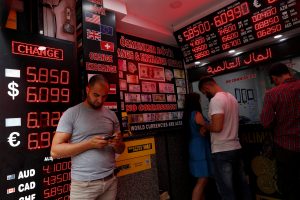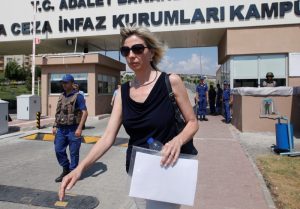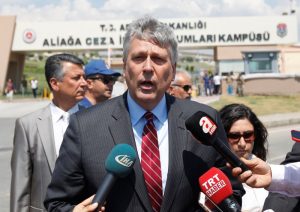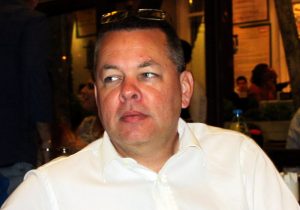
By Ezgi Erkoyun and Emily Wither
IZMIR, Turkey (Reuters) – The American evangelical Christian pastor at the center of a row between Ankara and Washington arrived at his home in Turkey on Friday after a Turkish court ruled he could go free, a move that may signal a major step toward mending ties between the allies.
Andrew Brunson arrived at his home in Turkey’s coastal province of Izmir, a Reuters cameraman said, having left the courthouse in a convoy of cars.
He was released after the court sentenced him to three years and 1-1/2 months in prison on terrorism charges but said he would not serve any further jail time. The pastor has lived in Turkey for more than 20 years and was put in prison two years ago and has been under house arrest since July.
U.S. President Donald Trump, who has imposed sanctions on Turkey in an attempt to secure Brunson’s freedom, tweeted: “PASTOR BRUNSON JUST RELEASED. WILL BE HOME SOON!”
Dressed in a black suit, white shirt and red tie, the North Carolina native wept as the decision was announced, witnesses said. Before the judge’s ruling he had told the court: “I am an innocent man. I love Jesus. I love Turkey.”
After the ruling, Brunson’s lawyer told reporters the pastor was likely to leave Turkey. The U.S. military has a plan to fly Brunson back to America on a military aircraft, officials told Reuters.
The diplomatic stand-off over Brunson, who had been pastor of the Izmir Resurrection Church, had accelerated a sell-off in Turkey’s lira currency, worsening a financial crisis.
Brunson had been accused of links to Kurdish militants and supporters of Fethullah Gulen, the cleric blamed by Turkey for a coup attempt in 2016. Brunson denied the accusation and Washington had demanded his immediate release.
Witnesses told the court in the western town of Aliaga that testimonies against the pastor attributed to them were inaccurate.
Brunson’s wife Norine looked on from the visitors’ area.
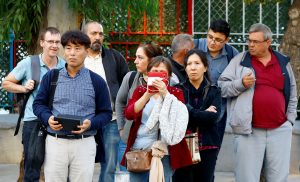
Supporters of U.S. pastor Andrew Brunson wait near his house in Izmir, Turkey October 12, 2018. REUTERS/Osman Orsal
‘GREAT CHRISTIAN’
Brunson’s mother told Reuters she and his father were elated at the news. “We are overjoyed that God has answered the prayers of so many people around the world,” she said.
Trump has scored points with evangelical Christians, a large part of his political base, by focusing on the Brunson case. The release could boost Trump’s ability to encourage such voters to support Republicans in large numbers in Nov. 6 elections, which will determine whether the party keeps control of Congress.
The heavily conservative constituency voted overwhelmingly for Trump in 2016. He has called Brunson a “great Christian”, and Vice President Mike Pence, the White House’s top emissary to evangelicals, had urged Americans to pray for Brunson.
“We thank God for answered prayers and commend the efforts of @SecPompeo & @StateDept in supporting Pastor Brunson and his family during this difficult time,” Pence wrote on Twitter. “@SecondLady and I look forward to welcoming Pastor Brunson and his courageous wife Norine back to the USA!”
U.S. broadcaster NBC said on Thursday that Washington had done a secret deal with Ankara to secure Brunson’s release.
“After an unjust imprisonment in Turkey for two years, we can all breathe a sigh of relief,” U.S. Ambassador to the United Nations Nikki Haley said on Twitter.
The lira stood at 5.9600 to the dollar at 1530 GMT, slightly weaker on the day after firming 3 percent on Thursday on expectations that Brunson would be freed.
NATO ALLIES
Relations between the two NATO allies are also under strain over U.S. support for Kurdish fighters in northern Syria, Turkey’s plans to buy a Russian missile defense system, and the U.S. jailing of an executive at a Turkish state bank in an Iran sanctions-busting case.
With Brunson’s release, attention may now turn to the fate of a Turkish-U.S. national and former NASA scientist in jail in Turkey on terrorism charges, as well as three local employees of the U.S. consulate who have also been detained.
Washington wants all these people released, while Ankara has demanded the extradition of Gulen. The cleric, who was lived in self-imposed exile in the United States since 1999, denies any role in the attempted coup.
Friday’s decision could be a first step to ease tensions, although Turkey’s presidency took aim at what it said was a prolonged U.S. effort to put pressure on its courts.
“It is with great regret that we have been monitoring U.S. efforts to mount pressure on Turkey’s independent court system for some time,” Fahrettin Altun, the presidency’s communications director, said.
Further moves which have been discussed include the return to Turkey of bank executive Mehmet Hakan Attila to serve out his sentence, the release of the U.S. consular staff, and agreement that the U.S. Treasury avoid draconian steps against Halkbank, the state lender.
“Like the Turkish courts, the Republic of Turkey does not receive instructions from any body, authority, office or person,” Altun, the Turkish official, said. “We make our own rules and make our own decisions that reflect our will.”
(Additional reporting by Mehmet Emin Caliskan in Izmir, Ali Kucukgocmen and Sarah Dadouch in Istanbul and Matt Spetalnick, Susan Heavey and Jonathan Allen in Washington, Writing by Daren Butler, David Dolan and Dominic Evans; Editing by Angus MacSwan, David Stamp, William Maclean)


